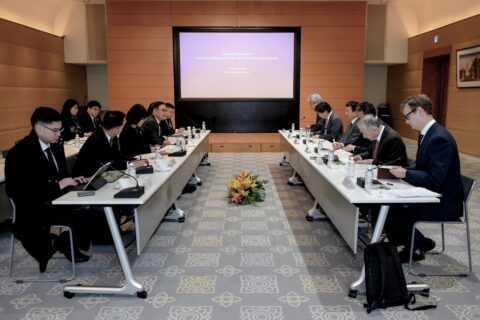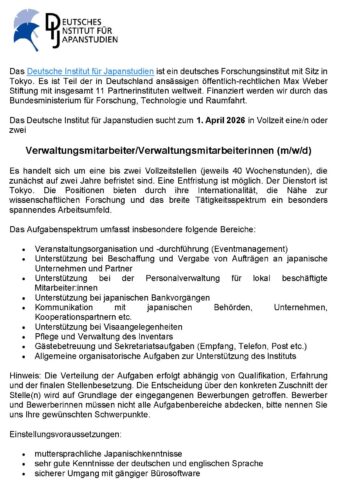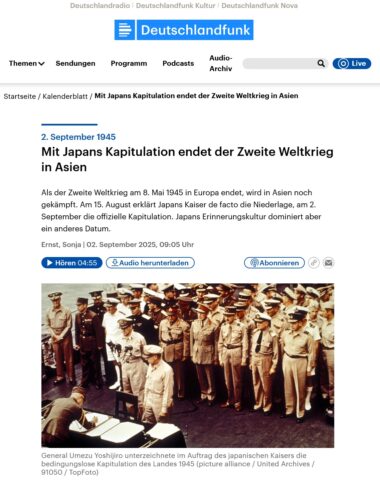Events and Activities
David Malitz joins roundtable discussion with Thai Foreign Minister
 On December 19th, DIJ Principal Researcher David M. Malitz was invited to join a roundtable discussion with Thai Foreign Minister Sihasak Phuangketkeow and Japanese academics at the Royal Thai Embassy in Tokyo. As the head of the research cluster Japan in Transregional Perspective, David conducts research on Japan-Southeast Asia relations. The discussion covered regional developments, Japan-Thailand relations, and potential future cooperation between the two countries. Thailand is a key economic partner of Japan, hosting approximately 6,000 Japanese companies and over 70,000 Japanese nationals. In November 2022, bilateral relations were elevated to the status of a Comprehensive Strategic Partnership. The year 2027 will mark the 140th anniversary of the establishment of diplomatic relations between Japan and Thailand.
On December 19th, DIJ Principal Researcher David M. Malitz was invited to join a roundtable discussion with Thai Foreign Minister Sihasak Phuangketkeow and Japanese academics at the Royal Thai Embassy in Tokyo. As the head of the research cluster Japan in Transregional Perspective, David conducts research on Japan-Southeast Asia relations. The discussion covered regional developments, Japan-Thailand relations, and potential future cooperation between the two countries. Thailand is a key economic partner of Japan, hosting approximately 6,000 Japanese companies and over 70,000 Japanese nationals. In November 2022, bilateral relations were elevated to the status of a Comprehensive Strategic Partnership. The year 2027 will mark the 140th anniversary of the establishment of diplomatic relations between Japan and Thailand.
DIJ Expertise on Japanese Economy and Society in German Media

For German media Deutsche Welle (DW) and Deutschlandfunk (DLF), Franz Waldenberger and Sebastian Polak-Rottmann have contributed their expertise in the fields of Japan’s economy and society, respectively. In a DW online article on Japan’s monetary policy, Franz Waldenberger explained that while the Japanese government was highly indebted, the economy as a whole was “rich”. Japan’s share of net foreign assets as percentage of GDP was “among the highest in the world”, he said. “I call it ‘rich country, poor government'”. In a German-language DLF radio feature on the problem of Japan’s abandoned houses (akiya mondai), Sebastian Polak-Rottmann commented on abandoned houses are “a symptom of demographic change and of migration” that could be observed both in rural and in urban areas. Since empty houses in rural areas often had strong family ties for their owners, many did not want to sell them, he explained.
Harald Kümmerle interviewed about Japanese digital strategy
-480x435.jpg)
“Japan’s digital policy is consensus-driven, differing from both Western and Chinese approaches”, says DIJ researcher Harald Kümmerle in a recent interview with Nikkei X-Tech, an online news portal of Japanese newspaper Nikkei Shinbun. Building on a widely recognised classification of global digital governance into three ideal types – market-driven (US), state-driven (China), and rights-driven (EU) – Kümmerle proposes Japan’s consensus-driven model as a distinct fourth type. This model, he argues, is characterized by soft regulation and administrative guidance rather than formal rule-making. This provides both opportunities and challenges. As Harald notes in the interview, “If Japan can expand its circle of partners among Indo-Pacific nations in the field of economic security, it may be able to mediate between the EU and the US.” The article (in Japanese) is available here.
Season’s Greetings and best wishes for the New Year
 Das Deutsche Institut für Japanstudien wünscht erholsame und frohe Festtage und einen guten Start in ein erfolgreiches Jahr des Pferdes!
Das Deutsche Institut für Japanstudien wünscht erholsame und frohe Festtage und einen guten Start in ein erfolgreiches Jahr des Pferdes!
The German Institute for Japanese Studies wishes you a happy holiday season and a successful Year of the Horse!
ドイツ日本研究所一同、皆様のご多幸と来るべき新年が成功の年になることを祈念いたします。
Stellenausschreibung Verwaltungsmitarbeiter/Verwaltungsmitarbeiterinnen (m/w/d)
 Werden Sie Teil des DIJ-Teams in unserer Verwaltung! Die ausgeschriebenen Stellen umfassen insbesondere folgende Aufgaben: Veranstaltungsorganisation und -durchführung (Eventmanagement); Unterstützung bei Beschaffung und Vergabe von Aufträgen an japanische Unternehmen und Partner; Unterstützung bei der Personalverwaltung, bei japanischen Bankvorgängen und Visaangelegenheiten; Kommunikation mit japanischen Behörden, Unternehmen, Kooperationspartnern; Pflege und Verwaltung des Inventars; Gästebetreuung und Sekretariatsaufgaben (Empfang, Telefon, Post etc.); allgemeine organisatorische Aufgaben zur Unterstützung des Instituts. Wenn Sie muttersprachliche Japanischkenntnisse sowie sehr gute Kenntnisse der deutschen und englischen Sprache haben sowie sicher sind im Umgang mit Bürosoftware, freuen wir uns auf Ihre Bewerbung bis zum 8. Januar 2026. Die vollständige Ausschreibung finden Sie hier auf Deutsch und auf Japanisch.
Werden Sie Teil des DIJ-Teams in unserer Verwaltung! Die ausgeschriebenen Stellen umfassen insbesondere folgende Aufgaben: Veranstaltungsorganisation und -durchführung (Eventmanagement); Unterstützung bei Beschaffung und Vergabe von Aufträgen an japanische Unternehmen und Partner; Unterstützung bei der Personalverwaltung, bei japanischen Bankvorgängen und Visaangelegenheiten; Kommunikation mit japanischen Behörden, Unternehmen, Kooperationspartnern; Pflege und Verwaltung des Inventars; Gästebetreuung und Sekretariatsaufgaben (Empfang, Telefon, Post etc.); allgemeine organisatorische Aufgaben zur Unterstützung des Instituts. Wenn Sie muttersprachliche Japanischkenntnisse sowie sehr gute Kenntnisse der deutschen und englischen Sprache haben sowie sicher sind im Umgang mit Bürosoftware, freuen wir uns auf Ihre Bewerbung bis zum 8. Januar 2026. Die vollständige Ausschreibung finden Sie hier auf Deutsch und auf Japanisch.
Call for Applications: Mobility Fellowships – Global Indo-Pacific
 We invite applications for mobility fellowships in the research node “Global Indo-Pacific: Connecting Histories and Futures” for research stays at any partner institution from one to two months between April and October 2026. The node presently includes researchers from five MWS institutes (DIJ Tokyo, GHI London, MWF Delhi, GHI Paris, GHI Washington), the Asia Research Institute (ARI) at the National University of Singapore and the Institute for Asian and African Studies at the Humboldt-Universität zu Berlin. Centered at ARI, it conducts research within the three modules “History, Heritage and Civilization”, “Knowledge, Networks and Institutions”, and “Earth, Energy and Water”. The mobility fellowships support self-chosen innovative research projects with links to one of the node’s module themes. This call for applications aims at strengthening and expanding networks within and beyond the research node. Application deadline: December 14, 2025. Details here
We invite applications for mobility fellowships in the research node “Global Indo-Pacific: Connecting Histories and Futures” for research stays at any partner institution from one to two months between April and October 2026. The node presently includes researchers from five MWS institutes (DIJ Tokyo, GHI London, MWF Delhi, GHI Paris, GHI Washington), the Asia Research Institute (ARI) at the National University of Singapore and the Institute for Asian and African Studies at the Humboldt-Universität zu Berlin. Centered at ARI, it conducts research within the three modules “History, Heritage and Civilization”, “Knowledge, Networks and Institutions”, and “Earth, Energy and Water”. The mobility fellowships support self-chosen innovative research projects with links to one of the node’s module themes. This call for applications aims at strengthening and expanding networks within and beyond the research node. Application deadline: December 14, 2025. Details here
DIJ research on the legacies of World War Two in East Asia quoted in German media

On the occasion of the 80th anniversary of the end of World War Two in Asia, DIJ historian Torsten Weber was interviewed by several German media. For German radio Deutschlandfunk, he explained why the day of Japan’s official surrender, September 2, only plays a minor role in Japan’s commemoration of World War Two. In articles published by Deutsche Welle and German newspaper taz on the occasion of the emperor’s declaration of defeat on August 15, he commented on differences in addressing war guilt between postwar Germany and Japan. An article published by science magazine Spektrum der Wissenschaft introduced Torsten’s research on historical revisionism in Japan and history politics in East Asia. Also in August, an article co-authored with Dolf-Alexander Neuhaus on the impact of Japan’s defeat on postwar and contemporary East Asia (“Divided States, Divisive Memories”) was published on the Max Weber Foundation’s The Ends of War blog. It had first appeared in German in the Frankfurter Allgemeine Zeitung as “Beschönigung der Kriegsverbrechen”.
Gerald D. Feldman Travel Grants for multi-country research projects
 You are an early career researcher looking for funding for research stays abroad of up to one month? If your countries of interest match, why not consider applying for a Gerald D. Feldman Travel Grants for researchers in the humanities and social sciences? Offered by the Max Weber Foundation (MWS), the travel grants allow you to conduct your own research project in two or three of the countries which are home to MWS institutes and branches or at the Richard Koebner Minerva Center for German History in Israel. We particularly encourage applicants whose research includes Japan. Application deadline: 5 October 2025. Please see the full call, list of possible host countries, and application guidelines here
You are an early career researcher looking for funding for research stays abroad of up to one month? If your countries of interest match, why not consider applying for a Gerald D. Feldman Travel Grants for researchers in the humanities and social sciences? Offered by the Max Weber Foundation (MWS), the travel grants allow you to conduct your own research project in two or three of the countries which are home to MWS institutes and branches or at the Richard Koebner Minerva Center for German History in Israel. We particularly encourage applicants whose research includes Japan. Application deadline: 5 October 2025. Please see the full call, list of possible host countries, and application guidelines here





 Open Access
Open Access
